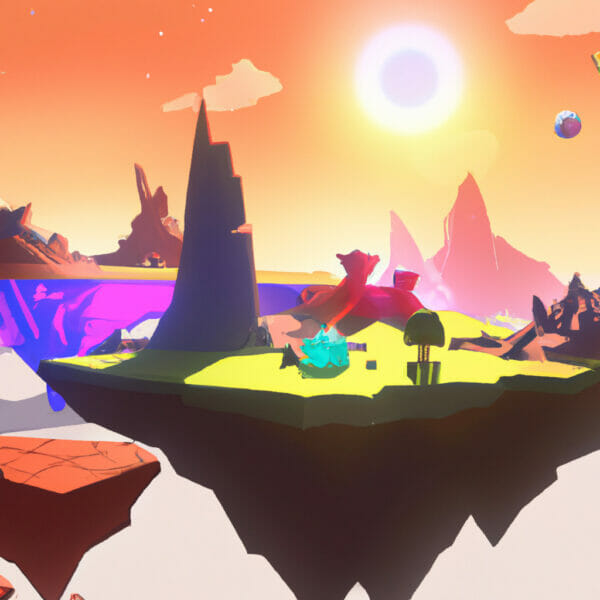Learning to code Python games is an excellent way for aspiring game developers to get started. Python is an accessible language for beginners, and there are plenty of resources available online to learn game development using Python. In this article, we will explore some of the best tutorials available for learning how to code games in Python.
We will also introduce Zenva’s Python Mini-Degree, a beginner-friendly resource that will help you get started with Python game development.
Table of contents
What is Python?
Python is a high-level, interpreted programming language known for its simplicity and readability. Created by Guido van Rossum in 1991, it has grown to become one of the most popular and versatile languages used by developers today. Python’s extensive library support, easy-to-learn syntax, and rich community make it an excellent choice for various development tasks, including web development, data analysis, artificial intelligence, and, of course, making Python games.
What Kind of Games Can be Built with Python?
Python is well-suited for creating a wide range of 2D and simple 3D games, including:
- Platformers
- Puzzle games
- Top-down shooters
- Text-based adventures
- Visual novels
- Roguelikes
While Python might not be the best choice for creating Triple-A titles, many successful indie games have been developed using it as their core language. But, let’s talk a bit more about the topic of Python games and their viability.
Why Python is Great for Game Development
Let’s talk about a more controversial point of this article: is Python good for game development?
Ask a room of coders and you’ll get a hundred different opinions on why any one language is good or bad for a specific task. Some users will tell you an interpreted language should never be used for games, while others will swear by the “superiority” of ancient languages like C for all programming. When it comes to using Python, Python game engines, and so forth, it is probably one of the most heated arguments you could be in.
So, is Python good for game development? That depends on your personal choice – but obviously, we think it’s a viable option since we’re writing this article!
Several factors make Python an excellent choice for game development:
- Readability: Python’s clean and easy-to-read syntax allows developers to quickly write and understand code, making it easier to maintain and improve the game.
- Speed of development: Python’s simplicity and extensive libraries enable developers to create games quickly, iterating through design changes with ease.
- Portability: Python can run on a wide range of platforms, making it easier to develop games that work on multiple devices.
- Community: Python has an active and supportive community, offering a wealth of tutorials, forums, and third-party libraries to aid game developers.
What about the arguments though about other languages? Let’s talk about why even then, Python games are a good option.
Why Use Python over Other Options for Games?
While other languages such as C++ and C# might offer better performance and have more established game engines like Unity and Unreal, Python offers several advantages that make it an appealing choice, particularly for indie developers and beginners:
- Ease of learning: Python’s simplicity makes it an excellent choice for beginners who are just starting to learn programming concepts.
- Rapid prototyping: The quick development cycle in Python allows developers to experiment with game ideas and concepts easily.
- Flexibility: Python’s versatility makes it useful for a variety of tasks besides game development (e.g., web development, data science), increasing its value as a skill for developers to learn.
Tools for Python Games
Games are easier to make when you have game engines, so are there any Python game engines out there?
Well, thankfully, there are several libraries and tools available to create Python games, including:
- Pygame: A popular library for creating 2D games in Python, with support for graphics, sound, and user input. Pygame provides a simple interface for developers to build and run games.
- Godot Engine: A powerful and open-source game engine that supports Python as a scripting language via its dedicated GDScript language. It allows developers to create both 2D and 3D games.
- Panda3D: A 3D game engine primarily developed in C++ but with support for Python scripting. It’s suitable for creating more visually complex games.
Below, we’ve compiled a list of the best resources for learning Python game development, covering tutorials and courses from both Zenva and other sources.
Zenva’s Python Mini-Degree
The Python Mini-Degree offered by Zenva Academy is a comprehensive collection of 11 courses designed to teach Python programming language. Suitable for beginners and experienced programmers alike, the courses cover coding basics, algorithms, object-oriented programming, game development (and Python game engines), and app development.
By mastering the skills taught in these courses, students can prepare themselves for roles in a wide range of industries. And, as is the topic of this article, learn to make Python games of all kinds.
Python Turtle Tutorial
This tutorial introduces Python programming using turtle graphics, a method of drawing shapes and images using code commands. The article guides the reader through setting up a Python development environment and using the turtle library to draw basic shapes. The tutorial culminates in a project to create a visualization of the solar system using turtle graphics.
When starting out, this is a great option for experimenting with Python games as the Turtle can work with user interactivity as well. So if you want to just get your feet wet, it’s worthwhile.
Getting Started with Python Game Development
This article recommends learning the core concepts of Python before diving into game development using PyGame, the main tool for building Python games. Several online tutorials and resources are listed, including Udemy Python Programming, Python for Beginners, and Think Python: How to Think Like A Computer Scientist.
Game Development with Pygame
This beginner’s guide teaches the basics of building Python games with Pygame. The tutorial starts with the basics of creating the framework for a game and progresses to loading and displaying images using Pygame’s blit method.

Creating a Turtle Racing Game in Python
This step-by-step guide demonstrates how to create a turtle racing game using Python and the Turtle library. The tutorial covers importing the Turtle and Screen modules, defining the game canvas, adding background graphics, creating turtle objects, setting their colors and random moving speeds, and defining the finish line.
Creating Games with HTML Canvas
This tutorial shows how to create games using HTML Canvas, a versatile alternative to Python for game development. The article includes references to various programming languages, tutorials, and courses for further learning.
MDN Web Docs Game Development Tutorials
The MDN Web Docs website offers a wealth of tutorials on game development for web developers, covering APIs for game development, canvas, CSS, full screen, gamepad, and more. The tutorials use different frameworks and tools, including pure JavaScript, Phaser, and A-Frame.
Conclusion
Learning to code Python games is an exciting journey, and with the right resources, it’s possible to get started quickly. The tutorials mentioned in this article provide a solid foundation for learning Python game development.
For a comprehensive and beginner-friendly resource, consider enrolling in Zenva’s Python Mini-Degree to kickstart your game development journey. Happy coding!
Did you come across any errors in this tutorial? Please let us know by completing this form and we’ll look into it!

FINAL DAYS: Unlock coding courses in Unity, Godot, Unreal, Python and more.







